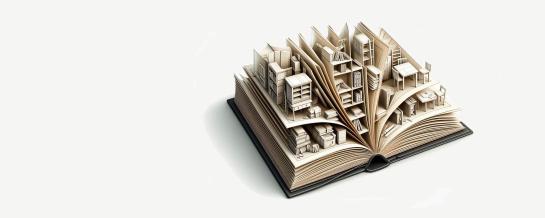
On 29 November 2024, the annual symposium of the VAL will take place at the KU Leuven Faculty of Arts. The VAL symposium consists of two parts. The first half of the programme, with keynote lectures (Prof. Dr. Babette B. Tischleder, Göttingen & Prof. Dr. Kiene Brillenburg Wurth, Utrecht) and a panel debate, is dedicated to the conference theme – “Literature and Materiality”. In the afternoon sessions, then, literary scholars from Flanders (or neighbouring regions and countries) have the opportunity to present their research in parallel sessions, with or without a connection to the conference theme. The aim of this part of the programme is to be as welcoming as possible to doctoral and postdoctoral researchers who want to present insights from their research. One or two of the parallel sessions will be related to the conference theme; the others will be open sessions, presenting ongoing research in the domain of literary studies.
The VAL symposium is organized annually by the Literary Studies Departments of KU Leuven, VUB, UGent and UAntwerpen. It rotates between the participating institutions and receives practical and logistical support from the host institution. It is also financially supported by the Flemish Interuniversity Council (VLIR).
Participation is free of charge but registration is required and possible until 22 November, 2024 using this form.
Theme and scope
In 1970, the Dutch poet J. Bernlef wrote that he loved poetry that was as ‘a thing among things’. He liked poems that were like ‘consumer goods’. This places him in a long tradition of writers and artists who are fascinated with the world of things and give it a prominent place in their work. In recent decades, literary studies have paid increasing attention to the material dimension(s) of literature. Scholars have investigated the ways in which literature participates in a broader material culture, while also exploring the ways in which the material reality of things and objects has been represented in literary fiction.
This ‘new materialism’ in literary studies follows two broad directions, either focusing on the materiality of the literary text, or on the materiality in the literary text. The first approach builds on disciplines such as book and print culture history, media studies, genetic criticism, and new philology. It deals with the production, circulation and consumption of texts and books as material objects. Starting from the insight that in order to be accessible, texts must be realized materially, this approach examines the implications of materiality for the function and meaning of literary texts. How does a book’s physical presentation affect the way we read it? What can we learn from an editorial history, from the culture of book collecting, or even from traces of use in individual text copies? How can we understand the interaction between the processes of producing, reading, and handling books? What is the role of the printed book as a material artefact in the digital age? But also: what can literary studies gain from cross-fertilization with the present research into books and book history? The second approach, which often relies more explicitly on theoretical, narratological and philosophical considerations (from Bill Brown’s Thing Theory to Bruno Latour's Actor Network Theory), pays particular attention to the way in which objects, things, matter are represented in literary fiction. This gives rise to questions such as: what role do things and objects play in the fictional universes of literature? How does literature conceive of and attribute meaning to things and objects? How do literary texts enter into dialogue with the broader historical material cultures in which they participate? How can a literary analysis of objects in literature provide an alternative to overly anthropocentric approaches to cultural phenomena and contribute to a posthuman critique? At the 2024 VAL Symposium we aim to look at these developments and questions from an international perspective, embracing the broad methodological, transnational, and transhistorical diversity of the research domain. Two international keynote speakers will provide us with ample food for thought. In the ensuing panel debate we will reflect on the challenges and opportunities for this type of research in the future. Afterwards, an issue of the Cahier voor Literatuurwetenschap (CLW) will be published on the basis of these and other contributions.
